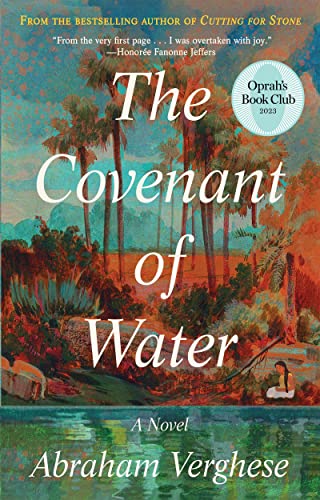The Covenant of Water

"masterful . . . each page in this massive book features exquisite descriptions, evocations of a particular time and place, populated by fascinating characters . . ."
Abraham Verghese is a masterful writer. Each page in this massive book features exquisite descriptions, evocations of a particular time and place, populated by fascinating characters. The plot follows one family that suffers from a peculiar "condition." People in this clan often die by drowning, at least one in every generation, sometimes more. We meet this family through a young bride who marries into it. She herself revels in water:
"When the monsoon arrives and the clouds open, she's ecstatic. In her father's house, she and her cousin would oil their hear and step out into the downpour with their soap and coconut-fiber scrub, delighting in the heavenly waterfall. They anticipated the monsoon as much as they did Christmas, a time when body and soul are cleansed."
For years, she doesn't understand her husband's fear of this renewing element. She only observes it sadly:
"Their eyes lock. As the boat pulls away, she registers his expression: sadness and envy. She aches for him, a man who won't travel by water, who perhaps has never heard the sound of water parting before the prow, never felt the exhilaration of being carried by the current, or the spray as the boatman's pole clears the water. He'll never know the bracing sensation of diving headfirst into the river, the roar of entry followed by enveloping silence. All water is connected, and her world in limitless. He stands at the limits of his."
And then, all too cruelly, she learns the reasons for his fear, and the name it has: the "condition."
Alongside the stories of this family, a second powerful theme emerges, that of medicine, of doctors working to heal and needing healing themselves. The two themes merge in a powerful and unexpected way, giving the book a resolution that both surprises and satisfies.
One reason why this book works so well is that each character feels uniquely real. There are no cliches here. So as the story slowly unfolds in layer after layer, one feels the texture of a complicated world, a family history that resonates with the countryside it happens in, as well as the intersection of European doctors and Indian culture.
The first doctor we meet, Digby, is Scottish. Though in Britain, he's not part of the "proper" class, didn't go to the "right" schools, and is considered a social inferior, in India he commands instant respect and privilege as a white man. It's something he's not comfortable with, acutely aware that both caste systems are deeply unfair:
"'I'm embarrassed how little I knew of India when I signed up,' Digby says suddenly. 'All I thought about was getting surgical experience—as if the Indian Medical Service existed to serve me.' He must raise his voice over the roar of crashing waves. 'I doubt I'll get used to the privileges I have here. I fear what might happen if I did.'"
This conflict makes Digby especially interesting. As his story becomes more complicated, these overtones enrich our sense of him and his place in his adopted home.
The last doctor, the one who ties up all the loose ends, is part of the family with the strange "condition." Not only is this an Indian doctor, she's a woman. The book opens in 1900, closes in 1977. Much has happened in India's history in that span, as well as in the families the reader follows. One of Verghese's many talents is how he makes this passage of time feel completely natural, always providing just the right amount of context to plant our feet firmly in the world of the story.
This is truly a gem of a book. As one of Verghese's characters says, "Fiction is the great lie that tells the truth about how the world lives!" This book delivers precisely that, many creative inventions building into a great truth.